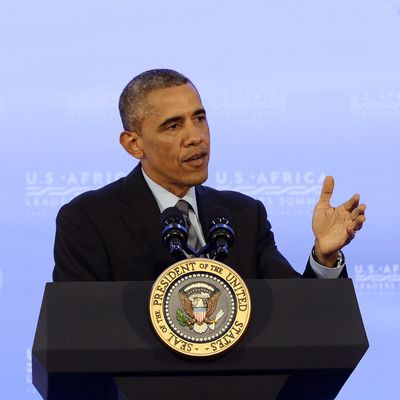
On Wednesday the CDC confirmed that the suspected Ebola patient in New York does not have the deadly disease, but that’s pretty much the only good news to emerge about the epidemic. While the outbreak is mostly confined to Guinea, Liberia, and Sierra Leone, it’s suspected that the disease killed a man in Saudi Arabia, and in Nigeria nine people are infected. The World Health Organization announced that it’s considering declaring an international public health emergency after 108 new cases were confirmed over the weekend, raising number of known infections to 1,711, with 932 deaths. And the apparent improvement of two America patients who received an experimental drug has sparked outrage over why the treatment isn’t being made available to Africans.
This week, three leading Ebola researchers said in a statement that African governments should have the opportunity to use the experimental drugs, which have only been tested on primates. “It is highly likely that if Ebola were now spreading in Western countries, public-health authorities would give at-risk patients access to experimental drugs or vaccines,” they said.
However, President Obama said at a press conference on Wednesday that it would be “premature” for him to weigh in on whether the serum, a drug cocktail called ZMapp, should be fast-tracked for approval or made available to patients outside the United States. “I think we’ve got to let the science guide us,” Obama said. “And you know, I don’t think all the information is in on whether this drug is helpful.”
The president said the disease can be controlled when there is a “strong public health infrastructure in place,” and for now the U.S. is focusing on helping the African countries contain the virus. “Let’s help to bolster the systems that they already have in place. Let’s nip as early as possible any additional outbreaks of the disease,” he said. “And then during the course of that process, I think it’s entirely appropriate for us to see if there are additional drugs or medical treatments that can improve the survivability of what is a very deadly and obviously brutal disease.”
There are several major hurdles preventing the treatment from being distributed widely, as Arthur L. Caplan, director of the Division of Medical Ethics at NYU Langone Medical Center’s Department of Population Health, explains in the Washington Post. First, the medication is extremely expensive and in short supply. The Americans were only offered the drug because Samaritan’s Purse, the organization they work for, sought out the untested treatments and made a deal with Mapp Pharmaceuticals in San Diego. It also requires careful handling and refrigeration, which is not available in many of the areas where the outbreak is the most severe.
Then there are the ethical concerns. While it’s not clear if the drug works, or how it could be distributed, the World Health Organization is convening a panel of medical ethicists to explore its use. The organization said the treatment of the two Americans, “has raised questions about whether medicine that has never been tested and shown to be safe in people should be used in the outbreak and, given the extremely limited amount of medicine available, if it is used, who should receive it.”






























